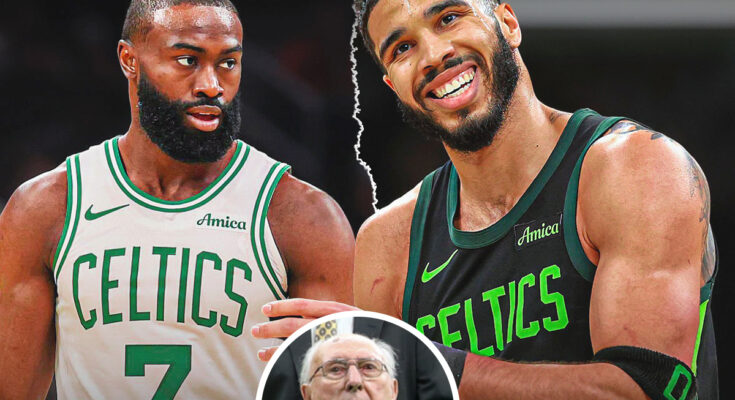Bob Cousy, the storied Celtics icon whose name is practically synonymous with the franchise’s early dynasty, didn’t hold back when weighing in on the current state of the team. The 97-year-old Hall of Famer recently spoke about the Celtics’ future, and his words wove a narrative both blunt and thought-provoking—particularly when he discussed Jaylen Brown’s capability to lead the Celtics in Jayson Tatum’s absence. Cousy’s frankness, rooted in decades of championship-level experience, immediately stirred a buzz among Celtics faithful.
“In my judgment, Jaylen is not quite at the superstar level that Tatum is at,” Cousy said, his tone measured but pointed. With that statement, he planted the seed for a seismic conversation: can Jaylen Brown, Finals MVP of the 2024 championship, truly carry the weight of the Celtics as their unquestioned top option?
The phrase that followed carried even heavier implications: “Can he carry the load by himself? I see a major rebuilding effort here. Jaylen certainly won’t bring them to the promised land.” To Cousy, the playoff-tested king who learned the hard truth of what it takes to win, Brown’s solo ceiling doesn’t reach the heights he and Celtics fans have become accustomed to.
Cousy’s observations hit the fanbase like a gut punch—not because they denied Brown’s talent, but because they challenged the recent narrative that Brown had “arrived” as a franchise anchor. After all, Brown had just captured Finals MVP honors with a stellar postseason performance—averaging 20.8 points, 5.4 rebounds, 5 assists, and 1.6 steals—helping deliver the franchise’s 18th championship. He’d also been a four-time All-Star, a bona fide star in his own right.
Yet Cousy’s critique wasn’t personal—it stemmed from an expectation formed by true greatness. He sees Tatum as the fulcrum, the one who, when sidelined, creates a seismic shift in team structure and effectiveness. Without Tatum, Cousy doesn’t believe Boston can realistically expect to compete for a title around him and Brown alone. It’s not a slight on Brown’s abilities; it’s a judgment rooted in the realities of roster construction and star power. “Derrick White’s a good player… but his game doesn’t lend itself to carrying a team,” Cousy added, underscoring the limitations of the supporting cast.
Notably, Cousy didn’t single out Brown. He saw the team’s wider context: Boston had shed significant talent—trading Jrue Holiday and Kristaps Porzingis, losing Luke Kornet, and with Al Horford unlikely to return—significantly weakening their depth in one offseason. Coupled with the massive payroll and luxury tax burden requiring financial maneuvering, Cousy believed Boston was forced into a constrained rebuild.
Even so, this wasn’t the final word about Brown. He remains young—his Finals MVP season came just a year ago—and gifted. Cousy himself has praised Brown’s evolution on other occasions. Back in June 2024, he acknowledged Brown’s growth in defense, passing, decision-making, and late-game poise. He even noted that while Brown didn’t yet match Tatum’s complete arsenal, he was “not far behind.” That sentiment highlights the complexity: Cousy respects Brown, but expects more.
Cousy’s comments spurred widespread discussion among fans—especially on Celtics forums and social media, where supporters weighed in with various reflections. Some pushed back gently, noting that Brown’s flaws—turnovers, free-throw shooting, defensive lapses—do exist, but so does his high ceiling and recent brilliance. Others emphasized how difficult it is to carry this kind of load alone.
One common sentiment was that Brown, while undeniably talented, has limitations as a primary initiator and franchise face. Some fans pointed to statistics that painted a telling picture: games where Tatum sat and Brown led the team often ended in narrow victories or outright losses. The team simply doesn’t function the same way when Tatum isn’t on the court. That’s not necessarily an indictment of Brown, but it does highlight the magnitude of Tatum’s impact.
Another argument offered by fans was the difference in playmaking. Tatum has consistently shown the ability to draw defenders and create for others—elevating the team’s offensive rhythm. Brown, meanwhile, thrives more as a scorer than a facilitator, often looking to create for himself. When opposing defenses zero in on him, Boston’s offensive movement tends to stagnate.
Still, many pointed out that expecting Brown to suddenly be a one-man wrecking crew is unfair. This isn’t a situation where he’s flanked by reliable co-stars; Boston’s depth has taken a hit, and Brown is also coming off meniscus surgery—something that affects explosiveness and mobility, especially early in the season. He’ll need time to find rhythm and carry such a heavy load.
Cousy’s concern isn’t rooted in pessimism but realism and experience. Legends like him see beyond individual brilliance—they obsess over the architecture of title contention. And Cousy’s additional commentary on the Celtics’ overreliance on three-point shooting reinforced that traditional mindset. He remarked that while the three-pointer is a weapon, it shouldn’t be the team’s default option. Instead, he advocated for an inside-out game, greater ball movement, and a return to fundamentals—elements he believes are critical in the postseason grind.
In many ways, Cousy’s statement wasn’t just about Brown. It was about the fragile balance that separates a championship team from a good team. Boston is walking that line now. Their big-money core is expensive, their depth is dwindling, and the competition in the East is only getting tougher. Cousy is sounding the alarm—not because he’s doubting the players, but because he’s seeing the forest while others focus on the trees.
Jaylen Brown, in this scenario, becomes the test case. If he can prove Cousy wrong—by leading the team effectively in Tatum’s absence, expanding his playmaking, stabilizing his decision-making under pressure, and elevating others around him—then Cousy’s comments will age as premature. But if Boston falters, if Brown struggles under the solo spotlight, then Cousy’s concerns will look less like criticism and more like prophecy.
There’s also a generational layer here. Cousy comes from a time when team structure, ball-sharing, and relentless hustle were non-negotiables. Today’s game leans more toward isolation, star-centric dynamics, and analytics. So when Cousy calls for a more foundational approach—less reliance on contested threes, more attacking the paint—it’s not outdated; it’s a caution based on what historically works in June.
Boston fans, ever passionate and fiercely protective of their players, responded to Cousy’s comments with mixed emotions. Some felt he was diminishing Brown’s accomplishments—especially so soon after a championship. Others admitted that, deep down, they’ve had similar thoughts: that Tatum is the irreplaceable engine, and that without him, Boston simply isn’t the same.
Yet almost all fans agreed on one point: the team can’t afford to coast on last year’s banner. Winning title No. 18 was sweet, but repeating in a shifting league with a thinner roster and lingering injuries won’t be easy. Brown, more than ever, must shoulder a leadership role that goes beyond points and highlight dunks. He must become the kind of player who dictates the tempo of a game, who makes others better, who shows that he’s not just a star, but the type of transcendent presence Cousy can believe in.
The burden now lies with Brown and the front office. Can Jaylen elevate his game once more—now without the benefit of Tatum drawing double teams? Can Brad Stevens find mid-season reinforcements? Can coach Joe Mazzulla mold a new identity around adversity and accountability?
For Cousy, who still watches every game and remains invested in Celtics culture, these aren’t abstract questions—they’re urgent. He doesn’t want to see Boston fade into mediocrity after one glorious season. He’s calling it like he sees it, and in doing so, he’s challenging not just Brown but the entire organization to rise above comfort and chase sustained excellence.
Jaylen Brown doesn’t have to be Jayson Tatum. But in the absence of his co-star, he will need to prove he can be something more than just a second option. He’ll need to be the kind of leader who makes people forget the pecking order—even for a moment.
Cousy’s words, harsh as they may seem, could be the fire that lights Brown’s next evolution. Or they may mark the beginning of a truth the Celtics must confront sooner rather than later: that no matter how deep your legacy runs, the future still has to prove itself—one possession at a time.



